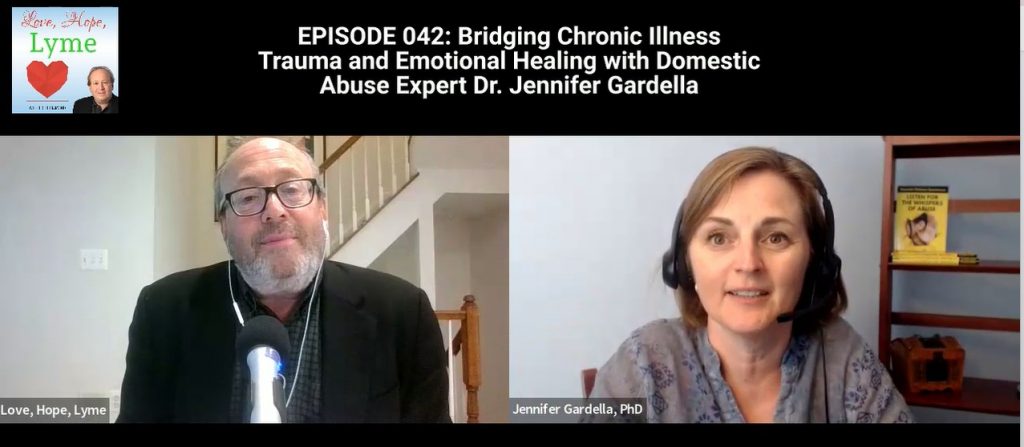PODCAST: Parallels between chronic Lyme trauma and domestic violence

By Fred Diamond
Trauma often manifests in ways that connect deeply disparate experiences. Dr. Jennifer Gardella is the author of Listen for the Whispers of Abuse. She joined me on the Love, Hope, Lyme Podcast to discuss the parallels between surviving domestic violence and managing chronic Lyme disease.
Both journeys can be underscored by profound trauma, relentless challenges, and societal misunderstanding. Gardella’s insights resonate profoundly with Lyme survivors, who often face similar isolation and disbelief about their struggles.
Jennifer likened unresolved trauma to pond scum on the psyche—preventing new, positive experiences from taking root. Through therapies like EMDR (Eye Movement Desensitization and Reprocessing), she found pathways to release the psychological grip of past events.
For chronic Lyme survivors, there are commonalities in the need to confront the layers of emotional and physical trauma inflicted by the disease and its societal stigmas. Both survivors of domestic abuse and chronic illness face retraumatization—whether by skeptical medical professionals, unsupportive loved ones, or systemic barriers to care.
We discuss how healing can come from community and shared understanding.
Listen for the Whispers of Abuse
In her book Listen for the Whispers of Abuse, Jennifer not only unpacks the devastating realities of domestic violence but also sheds light on the profound parallels between survivors of abuse and those battling chronic illnesses like Lyme disease.
Both face invisible yet life-altering trauma, compounded by societal misunderstanding, lack of resources, and long-term physical and emotional impacts.
Jennifer’s journey from domestic violence survivor to advocate offers crucial insights for all trauma survivors—whether their pain stems from abuse, chronic illness, or a combination of the two.
For survivors of chronic Lyme disease, life can feel eerily similar to an abusive relationship. Lyme often hijacks the body and mind, leaving individuals isolated, vulnerable, and dependent on others for support. Similarly, domestic violence survivors frequently find themselves trapped in cycles of control, manipulated by abusers who exploit their vulnerabilities.
Jennifer draws striking parallels between these two experiences. “When you live with Lyme or domestic abuse, you’re navigating a world that doesn’t always believe your pain,” she explains. Survivors of both often hear dismissive remarks like, “It’s not that bad,” or, “Why didn’t you fix it sooner?”
Just as Lyme survivors endure skepticism from medical professionals or loved ones, domestic violence survivors face questions that minimize their experiences: “Why didn’t you leave?” or “Why can’t you just move on?”
Jennifer emphasizes, “The trauma is not your fault. No one signs up for domestic violence, just like no one signs up to be bitten by a tick.”
The Cumulative Nature of Trauma
Jennifer describes trauma as cumulative, comparing it to stacking Lego blocks. Each incident, whether it’s an abusive episode or a Lyme flare, adds another layer of emotional and physical burden. Over time, these layers can manifest as severe psychological issues, eating disorders, or even physical illnesses.
For chronic Lyme survivors, the parallels are striking. Many Lyme patients experience ongoing trauma from misdiagnosis, medical gaslighting, or the unrelenting symptoms of the disease. Jennifer notes, “There’s little research tracking Lyme survivors 30 or 40 years into the future, but we see the patterns. Chronic illness and psychological abuse leave similar scars.”
She adds that both groups are often retraumatized. Lyme patients must constantly explain their medical histories to skeptical doctors, insurance companies, or even friends.
Domestic violence survivors face similar retraumatization, whether explaining their experiences to new therapists or navigating legal and financial systems manipulated by their abusers.
Healing Through EMDR and Community
A cornerstone of Jennifer’s healing was Eye Movement Desensitization and Reprocessing (EMDR), a therapy designed to help trauma survivors process painful memories. Initially skeptical, Jennifer found the process transformative.
“Trauma memories sit on top of our psyche like pond scum,” she explains. “EMDR breaks apart that scum, allowing new memories to flow in.”
This approach resonates deeply with chronic Lyme survivors. The trauma of enduring years of debilitating symptoms and skepticism from medical professionals creates emotional scars that can linger even after physical recovery. EMDR and trauma-informed therapies offer a way to address these psychological wounds.
Equally critical to healing is the power of community. Jennifer emphasizes, “We heal in community.” For both domestic violence and Lyme survivors, support groups provide a safe space to share experiences, find validation, and rebuild trust in others.
The Silent Abuse of Chronic Illness
Jennifer’s advocacy extends to recognizing the unique challenges faced by those with chronic illnesses who also endure domestic violence. Chronic illness can deepen dependency on abusers, who may weaponize control over money, healthcare, or housing.
“Abusers often exploit any vulnerability,” Jennifer explains. “If you didn’t have Lyme, there would just be something else they’d target.” She encourages survivors in these situations to seek confidential support through local domestic violence centers. These centers offer resources that address not only abuse but also the complexities of living with a chronic illness.
For Lyme survivors, Jennifer’s insights are deeply resonant. The disease itself can feel like an abuser, stripping autonomy and creating cycles of physical and emotional dependence. By acknowledging this dynamic, Lyme survivors can begin to reclaim their power, both from the illness and from any external sources of control.
Rebuilding Relationships Post-Trauma
Jennifer candidly shares how trauma shaped her relationships, including her ability to trust others. Chronic Lyme survivors face similar struggles. Whether navigating romantic partnerships or friendships, they often confront triggers, mistrust, and feelings of inadequacy.
In Jennifer’s case, her journey included learning to identify and address her own triggers. When dating her now-husband, she recalls, “The smallest things would set me off, but I had to remind myself he wasn’t my abuser.” For Lyme survivors, rebuilding relationships requires similar mindfulness and patience, both from themselves and their partners.
Jennifer emphasizes the importance of open communication and mutual understanding. “Partners of survivors need to recognize that healing is a partnership,” she says. This means acknowledging the trauma’s impact on both the survivor and the caregiver.
Lessons for All Survivors
Jennifer’s advocacy serves as a bridge between the experiences of domestic violence and chronic Lyme survivors, showing that while the sources of trauma may differ, the healing process shares the following universal truths.
- It’s Not Your Fault: Both Lyme and abuse survivors must internalize this truth. Trauma doesn’t stem from personal failure; it’s an external force that requires compassionate recovery.
- Healing Takes Time: Whether through therapies like EMDR, support groups, or trauma-informed practices, healing is a gradual, non-linear process.
- Community Matters: Isolation perpetuates trauma. Survivors thrive when they find safe spaces to share their stories and build connections.
- Advocate for Yourself: Lyme survivors and abuse survivors alike must navigate systems that often fail to understand or support them. Jennifer encourages survivors to seek external perspectives and resources to reclaim their power.
Moving Forward
For Jennifer, turning pain into purpose has been transformative. Her book and advocacy work now serve as lifelines for countless survivors navigating similar journeys.
To chronic Lyme survivors, Jennifer offers this empowering reminder: “You didn’t ask for this. You didn’t sign up for this. But you have the strength to heal.”
Her story is a testament to resilience and the enduring power of hope. By recognizing the shared experiences of trauma survivors— whether from domestic violence, chronic illness, or both—we can foster understanding, build stronger communities, and create pathways to healing for all.
Click here to listen to all episodes of the Love, Hope, Lyme Podcast or on YouTube.
Fred Diamond is based in Fairfax, Virginia and can be contacted via Facebook. His popular book, “Love, Hope, Lyme: What Family Members, Partners, and Friends Who Love a Chronic Lyme Survivor Need to Know” is available on Amazon. The e-version of the book is always free to Lyme survivors. PM Fred on Facebook or LinkedIn for your copy.





















We invite you to comment on our Facebook page.
Visit LymeDisease.org Facebook Page